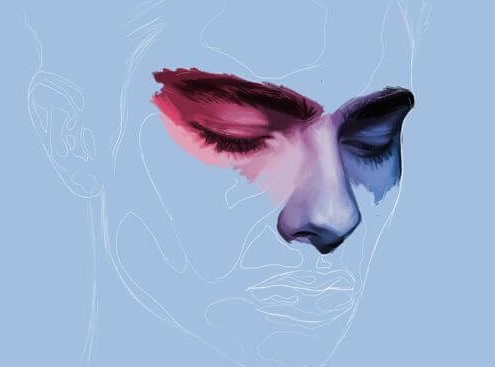3 Daily Habits that Are Increasing Your Risk of Depression

Depression is a serious illness and it demands our full attention. Unfortunately, in some places, there’s still the idea that it’s a condition that is best “handled” by ignoring it.
The thought is that people with it are weak, and if they don’t get out of it, they’re not trying hard enough. It’s seen as being dramatic.
This is a huge problem since depression does not just go away by itself. Quite the opposite. When it’s not addressed in time it can lead to a progressive decline and more serious illnesses, whether mental or physical.
Lifestyle is a determining factor when it comes to feeding or halting depressed states. Daily habits either positively or negatively influence the condition.
Some habits make you feel depressed more easily, while others will help relieve the symptoms and improve your mood. Next we’ll talk about three habits that will increase your risk of depression.
“Depression is nourished by a lifetime of ungrieved and unforgiven hurts”
-Penélope Sweet-

1. Poor Use of Time Can Up Your Risk of Depression
Routine, especially if you live in a big city, can lead to emotional fatigue. Every day you’re exposed to hundreds of stimuli, and a lot of them are aggressive.
In big cities there’s a general atmosphere of stress. It’ll be hard for you to find a friendly face, and everything happens extremely fast.
So free time shouldn’t just be a moment to pause. It should also be a space where you can encourage good mental health.
The problem is that our jam-packed days often make us not even know what to do with any free time. Sometimes we just use them to find peace and seclusion. Yes, this is good and restful, but it also feeds depression.
Ideally, free time will oxygenate both our body and mind. It will ideally include entertaining activities that make us laugh and have a good time.
It will renew our physical and mental energy. It will wake us up and improve our mood. Fresh air, nature, sports, or getting into a hobby are the most advisable things to do.
2. Poor Sleep Increases Your Risk of Depression
Nothing can replace a restful night’s sleep. When we sleep, we allow our brain to reorganize, re-situate, and filter information.
Sleeping well is part of mental well-being, but also good health. Rest is fundamental to being able to function in our daily lives.
Spending the whole night awake or sleeping poorly doesn’t take long to affect our state of mind. One of the first manifestations of this is a hypersensitivity that can easily turn into depression. It shows up as pessimism, irritability, and a lack of energy.

Having problems sleeping corresponds with unresolved issues manifesting as anxiety. At the same time, not resting enough will make us more vulnerable.
It’ll be harder to focus and solve problems. That’s how we begin a vicious cycle that can easily lead to depression.
3. Neglecting Your Personal Appearance
One of the first manifestations of depression is neglecting our personal appearance. It’s a sign of apathy towards yourself and the world.
Sometimes they’re short episodes that get better pretty quickly. Other times, though, they start to solidify into a constant attitude.
We’re not recommending worrying about every little detail of your outfit or how you do your hair. The healthiest thing is to just take a bath, put on clean clothes, and go out looking put-together.
This also extends to our environment. That is, the space we live in and the things that surround us.

When someone has depression, their appearance and, equally important, the orderliness of their home and workspace takes a backseat. They fall behind on cleaning.
But doing the opposite can really help. Taking care of ourselves a little bit and organizing our space even a little can improve our state of mind and protect us from the risk of depression.
Life never runs out of sadness and difficulty. It’s important to take care of ourselves and protect ourselves. Because if not, our negative feelings will take over.
We won’t just lose our interest in life, it could also make us sick. Picking up healthy habits and throwing out toxic ones is the best protection against depression.
Depression is a serious illness and it demands our full attention. Unfortunately, in some places, there’s still the idea that it’s a condition that is best “handled” by ignoring it.
The thought is that people with it are weak, and if they don’t get out of it, they’re not trying hard enough. It’s seen as being dramatic.
This is a huge problem since depression does not just go away by itself. Quite the opposite. When it’s not addressed in time it can lead to a progressive decline and more serious illnesses, whether mental or physical.
Lifestyle is a determining factor when it comes to feeding or halting depressed states. Daily habits either positively or negatively influence the condition.
Some habits make you feel depressed more easily, while others will help relieve the symptoms and improve your mood. Next we’ll talk about three habits that will increase your risk of depression.
“Depression is nourished by a lifetime of ungrieved and unforgiven hurts”
-Penélope Sweet-

1. Poor Use of Time Can Up Your Risk of Depression
Routine, especially if you live in a big city, can lead to emotional fatigue. Every day you’re exposed to hundreds of stimuli, and a lot of them are aggressive.
In big cities there’s a general atmosphere of stress. It’ll be hard for you to find a friendly face, and everything happens extremely fast.
So free time shouldn’t just be a moment to pause. It should also be a space where you can encourage good mental health.
The problem is that our jam-packed days often make us not even know what to do with any free time. Sometimes we just use them to find peace and seclusion. Yes, this is good and restful, but it also feeds depression.
Ideally, free time will oxygenate both our body and mind. It will ideally include entertaining activities that make us laugh and have a good time.
It will renew our physical and mental energy. It will wake us up and improve our mood. Fresh air, nature, sports, or getting into a hobby are the most advisable things to do.
2. Poor Sleep Increases Your Risk of Depression
Nothing can replace a restful night’s sleep. When we sleep, we allow our brain to reorganize, re-situate, and filter information.
Sleeping well is part of mental well-being, but also good health. Rest is fundamental to being able to function in our daily lives.
Spending the whole night awake or sleeping poorly doesn’t take long to affect our state of mind. One of the first manifestations of this is a hypersensitivity that can easily turn into depression. It shows up as pessimism, irritability, and a lack of energy.

Having problems sleeping corresponds with unresolved issues manifesting as anxiety. At the same time, not resting enough will make us more vulnerable.
It’ll be harder to focus and solve problems. That’s how we begin a vicious cycle that can easily lead to depression.
3. Neglecting Your Personal Appearance
One of the first manifestations of depression is neglecting our personal appearance. It’s a sign of apathy towards yourself and the world.
Sometimes they’re short episodes that get better pretty quickly. Other times, though, they start to solidify into a constant attitude.
We’re not recommending worrying about every little detail of your outfit or how you do your hair. The healthiest thing is to just take a bath, put on clean clothes, and go out looking put-together.
This also extends to our environment. That is, the space we live in and the things that surround us.

When someone has depression, their appearance and, equally important, the orderliness of their home and workspace takes a backseat. They fall behind on cleaning.
But doing the opposite can really help. Taking care of ourselves a little bit and organizing our space even a little can improve our state of mind and protect us from the risk of depression.
Life never runs out of sadness and difficulty. It’s important to take care of ourselves and protect ourselves. Because if not, our negative feelings will take over.
We won’t just lose our interest in life, it could also make us sick. Picking up healthy habits and throwing out toxic ones is the best protection against depression.
This text is provided for informational purposes only and does not replace consultation with a professional. If in doubt, consult your specialist.







